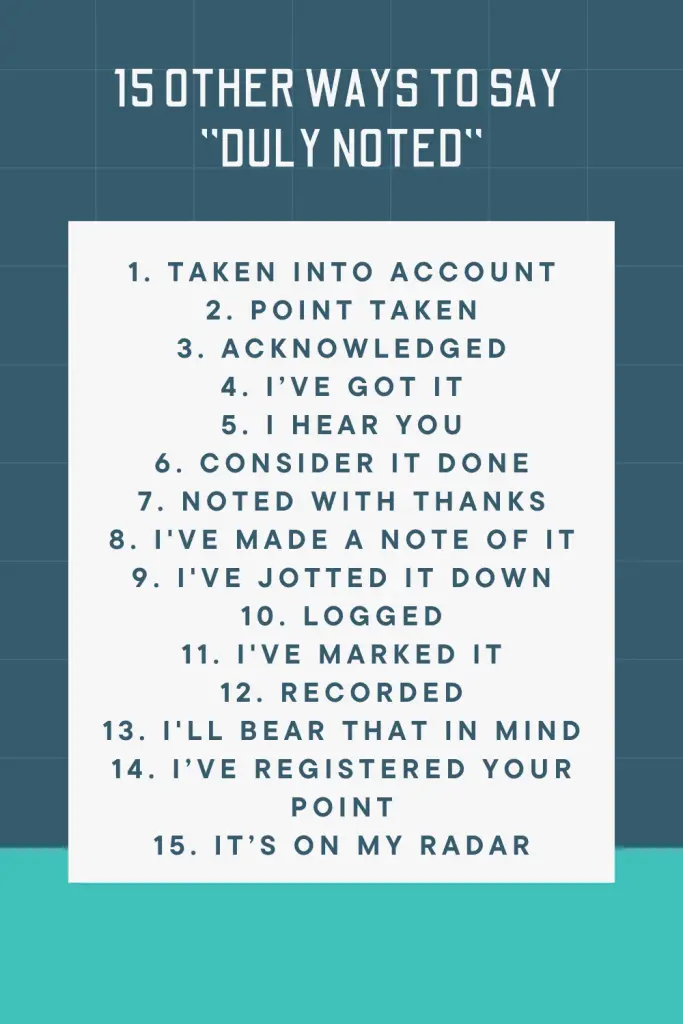When it comes to communication, variety is the spice of life. Expressing recognition or showing that you have considered something is no exception. “Duly noted” is a phrase often used to indicate that you have received and understood the information. But are there other ways to say “duly noted” that might be more appropriate for specific situations or to freshen up the conversation? Yes, there are!
Let’s dive into some alternatives to the term and find the perfect match for different contexts.
Other Ways to Say “Duly Noted”
1. Taken into account
Example: “I’ve taken your feedback into account.”
Meaning: “Taken into account” assures the listener that their input, opinion, or feedback is consciously integrated into the decision-making process or follow-up. It carries a connotation of respect for the person’s contribution, suggesting that their point of view carries weight or importance.
Usage: Often used in professional settings to indicate inclusiveness and consideration, such as when managers consider feedback from their team members.
2. Point taken
Example: “Point taken, I’ll be more careful next time.”
Meaning: “Point taken” is a brief acknowledgment that you not only understand what someone is saying but also see its value or relevance. It demonstrates your openness to other points of view and signals that you can change or reevaluate.
Usage: Common in both casual and professional dialogue where advice, feedback, or a different point of view is presented.
3. Acknowledged
Example: “Your concerns are acknowledged.”
Meaning: “Acknowledged” is a brief acknowledgment that you not only understand what someone is saying, but also see its value or relevance. It demonstrates your openness to other points of view and signals that you can change or reevaluate.
Usage: Common in both casual and professional dialogue where advice, feedback, or a different point of view is presented.
4. I’ve got it
Example: “I’ve got it, no need to repeat.”
Meaning: an informal phrase that not only shows understanding but also assures the listener that no further explanation is necessary. It’s a mixture of acknowledgment and reassurance.
Usage: It can be used in everyday conversation and is especially common when conveying instructions or information.
5. I hear you
Example: “I hear you; let’s discuss this further.”
Meaning: Beyond simple understanding, “I hear you” often carries an empathetic undertone. It validates the speaker’s feelings, concerns, or statements, signaling that their voice matters and is being mentally processed.
Usage: Highly effective in more personal conversations where emotional understanding is key, such as disagreements or heart-to-heart discussions.
6. Consider it done
Example: “You want the report by tomorrow? Consider it done.”
Meaning: This expression is both an acknowledgment and a strong affirmation. This goes beyond simply understanding a task; it is a promise of its completion, often in a confident and assured tone.
Usage: Best used when accepting tasks or responsibilities and wanting to express full dedication to the job.
7. Noted with thanks
Example: “Your suggestions on the project have been received and noted with thanks. We’ll implement them in our next phase.”
Meaning: This phrase is a polite way to acknowledge receipt of information. By adding “with thanks,” the sender expresses appreciation for the input, making the recipient feel valued. It is commonly used in professional settings, especially in written communication such as emails.
Usage: Commonly used in professional settings, especially in written communications like emails or formal correspondences where an appreciative tone is necessary.
8. I’ve made a note of it
Example: “You’d like the graphics to be adjusted by the end of the week? I’ve made a note of it.”
Meaning: This expression communicates that the speaker has taken a mental or physical note of something important. This assures the listener that their input or request will be remembered and acted upon.
Usage: Suitable for both casual and formal conversations when wanting to reassure someone that their input has been remembered.
9. I’ve jotted it down
Example: “Thanks for the recipe! I’ve jotted it down and can’t wait to try it out this weekend.”
Meaning: This usually indicates that the speaker has physically recorded the information provided. “Jotted” conveys a quick act of writing, implying immediate attention to the matter.
Usage: Often used in informal contexts or in situations where quick documentation is needed, such as taking a message over the phone.
10. Logged
Example: “The technical issue you reported has been logged, and our IT team is looking into it.”
Meaning: In a formal or technical context, “logged” means that information has been systematically recorded, often in databases or log files. It ensures that the data or problem is documented and will be addressed.
Usage: Primarily in technical or professional settings where systematic documentation, like in databases or logs, is essential.
11. I’ve marked it
Example: “I’ve marked the important dates on my calendar so I won’t forget our meetings.”
Meaning: This means that the speaker has marked or highlighted specific information for easy recall. The emphasis on “marked” suggests a deliberate act of prioritizing or remembering a detail.
Usage: Used in both casual and professional situations when emphasizing the act of prioritizing or highlighting certain details.
12. Recorded
Example: “All minutes of the meeting have been recorded for future reference.”
Meaning: This phrase means that the information was stored in a permanent or semi-permanent format. It can apply to both written and audio/video recordings, ensuring that details are not lost.
Usage: Best suited for formal situations where documentation, either written or audio/visual, is a requirement.
13. I’ll bear that in mind
Example: “You prefer morning meetings over afternoon ones? I’ll bear that in mind when scheduling our next session.”
Meaning: This statement indicates that the speaker will remember and consider a particular point or preference in future decisions or actions. It is an expression of understanding and adaptability.
Usage: Ideal for both personal and professional scenarios where adaptability and understanding are emphasized.
14. I’ve registered your point
Example: “I understand your reservations about the proposal, and I’ve registered your point.”
Meaning: A formal way of confirming understanding or acceptance of someone’s point of view. Shows respect for input by assuring the listener that their perspective is being considered.
Usage: Typically in professional or formal discussions where the emphasis is on recognizing and valuing diverse perspectives.
15. It’s on my radar
Example: “Don’t worry about the upcoming deadline; it’s on my radar, and I’m on track to complete the task.”
Meaning: An informal expression indicating awareness or attentiveness to a particular matter. It suggests that the speaker is monitoring or keeping an eye on the subject in question.
Usage: Commonly used in informal professional settings to convey awareness or monitoring of a task or subject.

The importance of acknowledgment
In communication, recognition serves a dual purpose. It assures the sender that their message has been received and understood. At the same time, for the recipient, it’s a way to build trust and establish clear lines of communication.
When you say “duly marked” or any of its alternatives, you are doing more than just saying words. You actively participate in the conversation, show respect, and build understanding.
When to Use Different “Duly Noted” Expressions
Casual conversations
In laid-back settings, phrases like “I hear you” or “I’ve got it” feel natural and fit the atmosphere.
Formal settings
In professional environments or formal correspondence, “duly noted” or “acknowledged” might be more appropriate to maintain decorum.
Empathetic situations
When someone is sharing feelings or concerns, “I hear you” or “point taken” can convey empathy and understanding.
Closing
In closing, it’s helpful to have options for how to say duly noted so you can spice up chats and make sure you’re coming across in a clear, polite way. Each choice works for its own situation and vibes. Next time someone gives you tips, feedback or info, keep these other ways to respond in mind so you can react in a fitting manner.
If you want get even better at communicating, think about checking out Preply or Duolingo or something similar. They have great stuff and teachers to boost your skills with language.
FAQs
1. Is “duly noted” considered formal? Yes, “duly noted” is often deemed formal. It’s commonly used in official settings or written communications.
2. Can “duly noted” come off as dismissive? While “duly noted” is a genuine acknowledgment, tone and context matter. In certain situations, if said without care, it might sound dismissive. Ensure to match the acknowledgment to the mood and intent of the conversation.
3. Are there situations where “duly noted” is inappropriate? Yes. In deeply emotional or sensitive conversations, a more empathetic acknowledgment like “I understand your feelings” or “I hear you” might be more appropriate.









